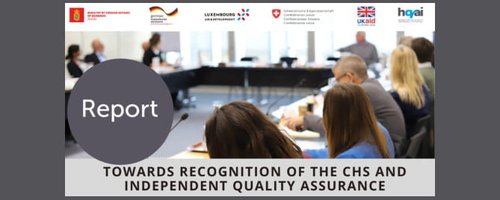2021 Donor Round Table
Would you dare? Three ways to simply align on Donors' Due Diligence.
Every donor comes with their individual Due Diligence (DD) requirements. The issue is widely recognised, but the alignment of DD processes progresses slowly. Yet, tools exist to create significant savings in human and financial resources, allow for a better understanding of the practical hurdles to harmonising DD requirements, and foster alignment based on practical experience.
The objective of the 2021 October Round Table was to share and discuss how HQAI audits based on the Core Humanitarian Standard (CHS) can offer pragmatic solutions:
- Filling two needs with one deed: one audit feeding into two separate sets of requirements.
- Reducing duplication: total or partial substitution of other DD processes.
- Contributing to localisation: direct funding for national NGOs.
Case 1: Filling two needs with one deed. One audit feeding into two separate requirements.
A typical CHS Certification audit covers approximately 80% of the information required for an ECHO assessment. The remaining 20% of data can also be produced by HQAI, adding additional questions to the same audit. With the wealth of information produced in one “extended CHS audit” for an INGO, HQAI produced a CHS Certification report and an ECHO ex-ante FPA report that was submitted to and accepted by ECHO early 2021.
“So much more information is collected that never makes it into the CHS audit report. It is this amount of information that allows for HQAI to offer such bridges”.
For the audited organisation, this combined process reduced the administrative and HR burden and created significant financial savings. In an aspiration towards more aid effectiveness, these savings were used more wisely and directly channeled into aid projects and partners of the organisation.
“The cost of HQAI completing the ECHO audit was 10 times less than employing another audit firm.”
Experience demonstrates that HQAI is a serious partner in DD discussions. Since the successful bridge from CHS to ECHO was published early 2021, several governments have reached out to HQAI in order to understand how they could advance on revising their own DD processes.
The timeliness of these bridges is an important element. They are feasible now and the mechanism is transferable to other partners and tools, be they pool funds, governments, INGOs or networks.
Case 2: Reducing duplication. Total or partial substitution of other DD processes based on trust.
Germany’s humanitarian division has implemented a simplified process for organisations that are verified against the CHS or registered as ECHO partners. The due diligence process is based on a quality profile composed of 111 questions that organisations need to answer. For those that are CHS verified, this questionnaire is diminished to 67 questions.
For donors, DD is necessary risk prevention. In parallel, it increases the investment (time, money, efforts) and challenges for the organisations. Small and local NGOs in particular see it as very challenging to demonstrate fulfilment of DD requirements from various donors and they might even shy away from applying. For donors who want to partner with these organisations it is a shame to loose this link to local competence, capacity and effectiveness.
“If the DD burden makes local organisations shy away from applying, this is a great loss for us as donors and for implementation as such.”
At an other end of the spectrum, the Grand Duché du Luxembourg is a donor with limited manpower to undertake complex due diligence processes. To palliate this situation the Grand Duché relies on the assessments made by other European donors and particularly ECHO. Luxembourg has also decided to make CHS independent verification or certification mandatory for their partners in the future.
Case 3: contributing to localisation: direct funding for local NGOs.
Denmark’s DANIDA recognises HQAI’s CHS audits by making it a requirement for NGO partners to be independently verified or certified against the CHS. The UK is conducting a gap analysis with the CHS and HQAI vs. the five pillars in UK DD.
While trust in independent CHS quality assurance undoubtedly exists, donors are still some steps away from actually having local NGOs benefit from this recognition and receive direct funding. Donors are strongly committed to localisation, yet the direct financing of national organisations would create an administrative burden that is outside the capacity of most donors to manage.
“There’s a lot of talk about channeling direct funds to local organisations, but we really have to make this happen in practice.”
DANIDA and FCDO presented a joint project with HQAI to pilot the use of CHS certification to allow direct funding to national NGOs and assess the potential CHS certification presents to resolve this conundrum.
The project will map the due diligence requirements of both donors against the CHS and one against the other, with the hope to identify a common bridge with a CHS audit. Clearly rooted in the localisation agenda, this project will also bring important information regarding the possibility to create a “universal bridge”.
Finally.
Participants regularly highlighted the quality of the CHS as the core standard on quality and accountability. There is also a growing evidence that independent quality assurance against the CHS, in particular certification, speeds up the implementation of the CHS.
“It is enabled by the CHS and grounded in the CHS. The audits make the bridges possible.”
The concrete case illustrated by a bridge from a CHS audit to ECHO FPA requirements is an example of a technical solution that can be replicated to other donor requirements, be they governments, networks or pool funds. The winning argument is that an alignment with CHS Verification contributes to reducing duplication without diminishing the specific criteria catalogues of individual donors. The wealth of data offers significant insight and identifies overlaps of DD requirements, hence contributes to the overall harmonisation agenda.
“The CHS offers a good platform to minimise the impact of duplication. Less time for the auditor, less time for the auditee and important financial savings”.
This Round Table was not a pitch to sell an organisation. It was a privileged space to explain a service for the sector to promote accountability and quality, including a way of reducing duplication in due diligence requirements. Read the detailed meeting minutes here. HQAI thanks all participants for their participation, openness and transparency. We also thank our donors who co-hosted this event for their ongoing strategic and financial support.
Further reading

2021 Round Table Report
The detailed meeting minutes of the 90 minutes event with donors and interested parties.

The bridge to ECHO FPA
How one extended CHS audit covered the requirements of the ECHO ex-ante FPA

Last year's Round Table
Towards more recognition of the CHS and independent verification against it
Category